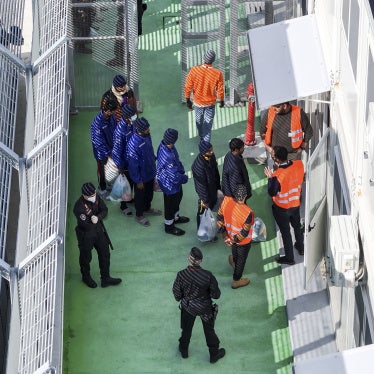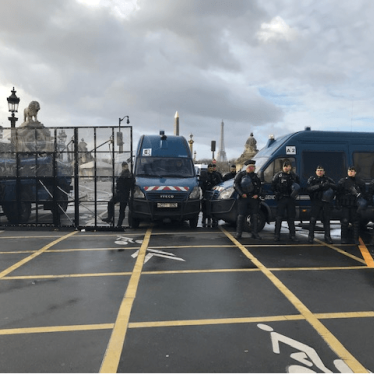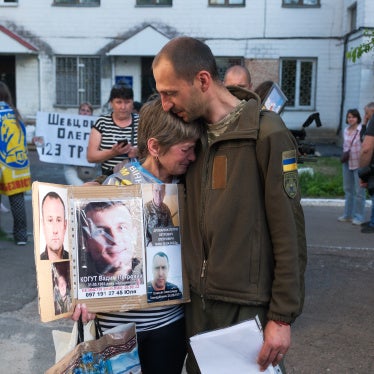Russian forces have blockaded more than 4,000 civilians in the Chechen village of Tangi Chu. According to reports collected by Human Rights Watch, Russian soldiers have repeatedly detained and beaten young men, extorting bribes for their release. In at least one instance, Russian soldiers threw a grenade at a funeral.
Four witnesses from Tangi Chu who managed to escape at great personal risk reported to Human Rights Watch that the village is deprived of food or water. Located approximately 25 km south of Grozny, Tangi Chu has been cut off since January 14, 2000. The village was the site of the brutal rape and murder of eighteen-year-old Heda Kungayeva on Sunday, March 26 (See, "More Evidence of Rape by Russian Forces in Chechnya," HRW Release March 30, 2000).
The four witnesses reported that young men between the ages of sixteen and thirty are routinely detained by the Russian forces in the village, and beaten and humiliated in front of other villagers. Prisoners are then taken to the Russian positions in the hills where they are held in pits in the ground. The Russian forces inform the families of those detained that they must provide the soldiers with guns within two hours, or the detainees will either be killed or transported to filtration camps. The witnesses told Human Rights Watch that there are no weapons in the village, so the villagers are forced to purchase weapons from the Russian soldiers in order to exchange them for the detainees. The witnesses say, those detained are severely beaten and tortured.
"Ibragim I." (not his real name) provided Human Rights Watch with the names and ages of twelve men who were arrested and detained in this manner between March 24 and March 28. One of the twelve had been detained, beaten, and ransomed three times. Another of the twelve is a deaf mute who was detained and beaten twice—the second time, his ribs were broken. Ibragim reported that a third man of the twelve was taken to the "Internat" filtration camp in Urus Martan (approximately seven kilometers from Tangi Chu.) He was held for two days in a van and for two days in the detention center. His relatives paid three automatic guns and a car to get him released, after which the Russians released him in Tangi Chu to ensure that he would not escape the village. This man had three broken ribs, and his body was covered with bruises.
Ibragim I. reported that on March 26, the administrator of Tangi Chu, a Chechen, was detained and severely beaten because he had asked the Russian soldiers to allow the young people in the village to go to the school to vote in the presidential election. Ibragim I. told Human Rights Watch that he attended a funeral at the end of February during which the Russian forces came, forced several young men to strip naked in front of the other mourners, and beat them. These men were then taken in APCs to the Russian positions and held in pits until their relatives provided guns in exchange for their release. Both Ibragim I., and "Alisa A." (not her real name) reported that these men were returned with blood flowing from their mouths, unable to stand.
"Adil A." (not his real name) cited the names of several of the same men whom Ibragim I. described to Human Rights Watch. Furthermore, Adil A. and his sister "Fatima F." (not her real name) reported that on March 18 or 19, a fifteen-year old, his father, and Adil A's twenty-two-year-old brother were stopped on their tractor by Russian contract soldiers in a military truck. The soldiers proceeded to beat the two young men with rifle butts and to kick them. Adil A. and some other villagers witnessed this, and when they came close, the Russians stopped and let the boys go. Both boys were covered in blood and could not breathe. Adil A.'s brother was cut on his lower back, and his face and body were severely bruised.
Adil A. and Fatima F. further reported a second incident on the same day, when three men were stopped on their tractor and beaten approximately 500 meters from where the other three had been attacked. Adil A. witnessed the beating and Fatima F. saw the men afterwards. One of the men was cut across the top of his head and on his forehead, and the left side of his face was swollen and bruised. He had difficulty breathing due to the beatings.
Adil A. and Fatima F. reported to Human Rights Watch that on the same day, March 18 or 19, a twenty-year-old villager went into his garden to get wood. He was taken away by Russian soldiers, and no one knew where to look for him. The next day, the villagers were told that the young man had been accused of selling weapons. One half hour later, the young man was brought back into the village unconscious, and thrown onto the road. Adil A. spoke to the young man after he recovered consciousness, who reported that he had been tortured with electric shocks in detention.
Also on March 18 or 19, according to Adil A. and Fatima F., Russian soldiers launched a small grenade into the crowd at a funeral in the village. Two older men, both approximately sixty years old, were wounded by the shrapnel, one in the elbow and one in the thigh. The Russian forces surrounding the village would not allow the men to be taken out of Tangi Chu to a hospital, and the shrapnel has not been removed.
Ibragim, Alisa, Adil, and Fatima all reported to Human Rights Watch that in addition to the violence and beatings that are being perpetrated against the residents of Tangi Chu, there is a severe humanitarian crisis in the village. There is no water for drinking or washing. The river which runs through the village is polluted by the Russian forces who drive their APCs and trucks through the river, and can therefore not be a source of drinking water. Furthermore, the Russian forces have destroyed the pipeline which brought fresh mountain spring water into the village. The forces allegedly shelled the pipeline just past the Russian positions, so that the Russian troops can obtain fresh water from the pipeline, but the villagers cannot.
For food, villagers have been eating raw wheat boiled in water, and they are forced to cut down fruit trees for wood. Witnesses report severe cases of malnutrition, dehydration, tuberculosis, dysentery, digestive diseases, lung diseases, several kinds of serious skin diseases, and lice infestations. No medical care is available in the village, and the Russian forces do not allow villagers to travel out of the village to obtain care. One day in late March a Russian doctor was allowed to treat those civilians who had been either injured by shelling and shrapnel, or who had been severely beaten by Russian troops. This doctor examined some of the villagers suffering from other ailments as well. The next day, the doctor was transferred out of Tangi Chu, and the villagers have since been prevented from receiving medical care of any kind. Within the past few weeks, according to witnesses from the village, the Russian forces have begun to accept bribes from some women in the village to use their APCs to transport them out to purchase food.
Human Rights Watch welcomes reports that the Russian colonel responsible for the rape and murder of Heda Kungayeva will be prosecuted. However, her case was not an isolated incident of severe ill-treatment. Human Rights Watch calls on President Vladimir Putin immediately and unequivocally to put an end to any and all human rights abuses being perpetrated against civilians in Chechnya. Human Rights Watch further calls on the Russian government to open immediately the roads into and out of Tangi Chu and any other blockaded villages, to ensure that the civilians receive food, water, and medical care, and to cease immediately the detentions and beatings of the villagers.







